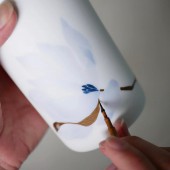Craftal Craft Tableware by Culture Generation Japan |
Home > Winners > #139328 |
 |
|
||||
| DESIGN DETAILS | |||||
| DESIGN NAME: Craftal PRIMARY FUNCTION: Craft Tableware INSPIRATION: The Japanese traditional craft industry is facing problems such as declining sales, labor shortage, product development, and lack of ability to develop sales channels in each process from production to sales due to the division of labor. On the other hand, although there is a need for restaurants to use traditional crafts, there are not many opportunities to purchase them because of the time and cost involved. This service was created in the process of thinking of ways to solve such problems. UNIQUE PROPERTIES / PROJECT DESCRIPTION: Craftal is a subscription service that provides Japanese craft tableware to restaurants and households, fostering a new environment where people can meet a wide variety of traditional crafts from all over Japan. This platform to solve these issues faced by both the restaurant side and the craftsmen, and we have now we started working directly with chefs to develop highly usable tableware products by incorporating their feedback and experiences. OPERATION / FLOW / INTERACTION: 1. Users select 30 tableware pieces from the physical gallery or online catalog. Specially tailor-fit selections based on consultations by a curator is also available. 2. Once inventory is confirmed at the distribution center, the tableware will be sent to the restaurant for an initial trial period of three months. 3. After three months, the customer will either exchange or return the tableware pieces, and those returned will undergo maintenance at the distribution center before being sent to use at another restaurant. PROJECT DURATION AND LOCATION: The service was first established in June 2019 in Tokyo as a B2B platform connecting restauranteurs and craftsmen in Japan and is still continuing to this day. Targeting individual households, the B2C service was launched in May 2020 to address people spending more time at home due to the spread of COVID-19 infection. |
PRODUCTION / REALIZATION TECHNOLOGY: Craftal’s business model was designed to solve problems faced by both craftsmen who make tableware and the restaurants who use them. For craftsmen, it is difficult for them to sell expensive products, but it is difficult for them to expand their craft if they only make pieces that can be sold cheaply. For restauranteurs, buying a wide variety of tableware is expensive, especially because they have to rotate it seasonally to pair with changing dishes depending on the time of year. SPECIFICATIONS / TECHNICAL PROPERTIES: The current scale of the business is as follows: 1) More than 300 products available, 2) Over 30 restaurants, 3) Over 50 end-users, 4) Over 50 craftsmen and artisans, 5) Over 500 people participating in trial events. TAGS: Japanese traditional craft industry, Japanese tableware, subscription service, craftsmanship, Japanese craft, circular economy, sustainability, craftal RESEARCH ABSTRACT: We conducted interviews with numerous hotels and restaurants and found that for restauranteurs, they wanted to purchase a wide variety of tableware to pair with seasonal menus, but there were three main barriers to this: 1) price, 2) storage, 3) opportunity cost (ie. time spent researching and purchasing). Also, we learned that there are many levels of middlemen, which means that craftsmen cannot directly get feedback from the restauranteurs, affecting standards for product development. CHALLENGE: When Craftal was first launched, COVID-19 infections began to spread around the world in early 2020. Since our initial target, which consisted of restaurants that were negatively impacted by this, we had a difficult time promoting the service. Our response was to start a B2C service targeting individual households and we were able to increase awareness of the service this way. Also, we tried to appeal to a larger group of customers, and realised there was a need from restaurants specialising in Western cuisine, which we did not foresee as our initial focus on just Japanese restaurants. ADDED DATE: 2022-03-15 06:06:01 TEAM MEMBERS (6) : Producer: Takuya Hotta, Director: Hideya Izawa, Designer: Shugo Urata, Curator: Aki Yasuda, Planner: Takahiro Tsuchida and Planner: Yumi Takahashi IMAGE CREDITS: Culture Generation Japan, 2021. |
||||
| Visit the following page to learn more: https://craftal.jp/ | |||||
| AWARD DETAILS | |
 |
Craftal Craft Tableware by Culture Generation Japan is Winner in Cultural Heritage and Culture Industry Design Category, 2021 - 2022.· Press Members: Login or Register to request an exclusive interview with Culture Generation Japan. · Click here to register inorder to view the profile and other works by Culture Generation Japan. |
| SOCIAL |
| + Add to Likes / Favorites | Send to My Email | Comment | Testimonials | View Press-Release | Press Kit |







